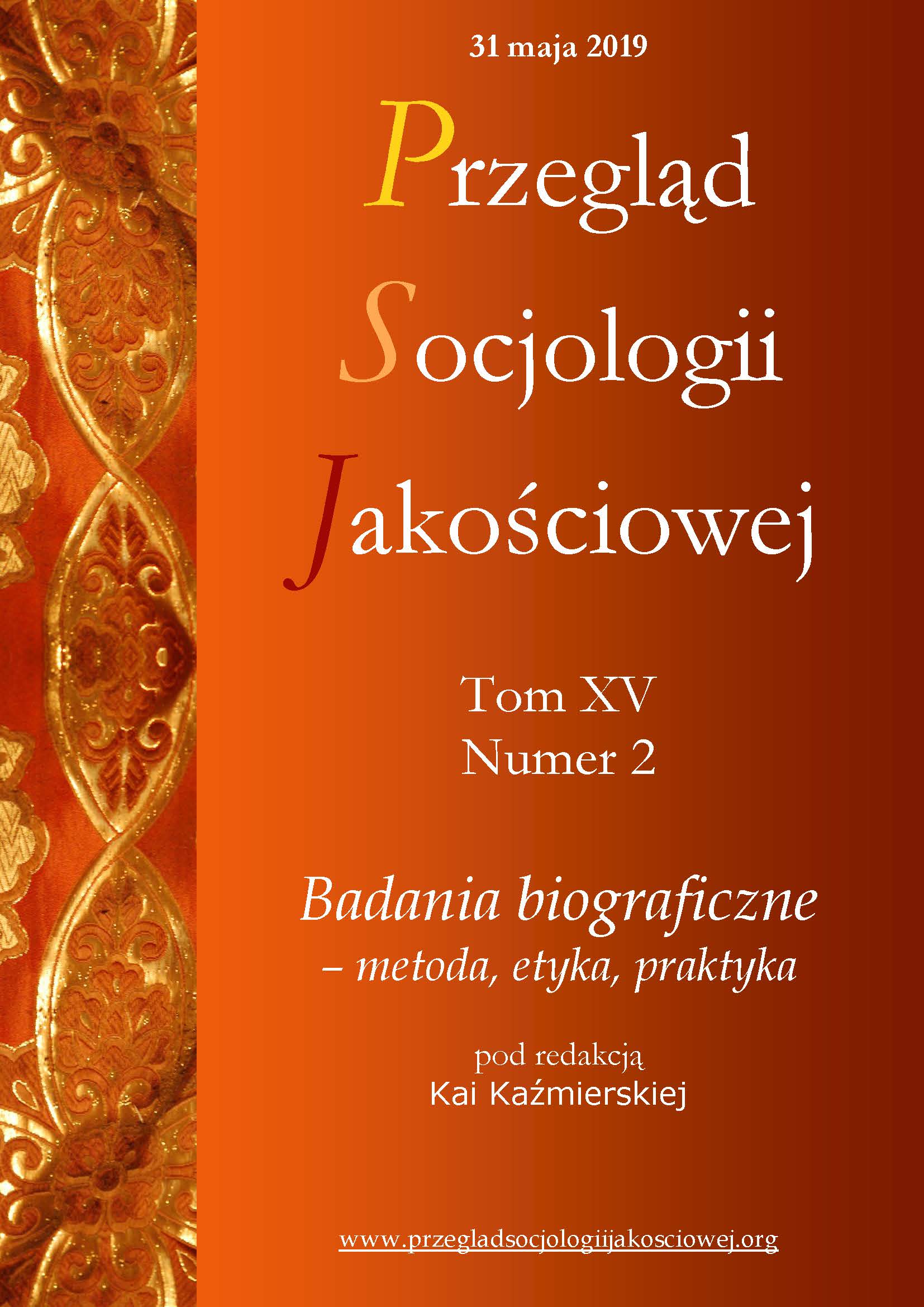Praca warsztatowa jako warunek sine qua non badań biograficznych
DOI:
https://doi.org/10.18778/1733-8069.15.2.09Słowa kluczowe:
warsztat, analiza danych jakościowych, analiza biograficznaAbstrakt
Celem artykułu jest refleksja na temat wartości pracy warsztatowej w metodzie biograficznej. Wspólna praca nad tekstem jest nie tylko elementem pracy analitycznej, ale powinna być uznana za jeden z niezbędnych kroków procedury analitycznej prowadzącej do refleksji teoretycznej. Artykuł składa się z następujących części: krótkiej prezentacji historii idei warsztatów analitycznych w polu badań biograficznych zwłaszcza w odniesieniu do pracy ze studentami; opisu korzyści charakterze edukacyjnym, analitycznym i teoretycznym, jakie płynąć mogą z pracy zespołowej; charakterystyki konkretnych przykładów warsztatowej pracy badawczej i jej rezultatów w formie tekstów pokazujących różne podejścia analityczne i teoretyczne.
Pobrania
Bibliografia
Allert, Tilman et al. 2014. “Forschungswerkstätten – Programme, Potenziale, Probleme, Perspektiven.” Pp. 291-316 in Qualitative Forschung. Analysen und Diskussionen – 10 Jahre Berliner Methodentreffen, edited by G. Mey and K. Mruck.. Wiesbaden: Springer VS.
Google Scholar
Apitzsch, Ursula and Lena Inowlocki. 2000. “Biographical Analysis. A ‘German’ School?” Pp. 53-70 in The Turn in Biographical Methods in Social Science, edited by P. Chamberlayne, J. Bornat, and T. Wengraf. London, New York: Routledge.
Google Scholar
Campbell, Donald and Donald Fiskel. 1959. “Convergent and Discriminant Validation by the Multitrait-Multimethod Matrix.” Psychological Bulletin 56:81-105.
Google Scholar
Corbin, Juliet and Anselm L. Strauss. 1990. “Grounded Theory Research: Procedures, Canons, and Evaluative Criteria.” Qualitative Sociology 13:3-21.
Google Scholar
Czyżewski, Marek. 2013. “Socjologia interpretatywna i metoda biograficzna: przemiana funkcji, antyesencjalistyczne wątpliwości oraz sprawa krytyki.” Przegląd Socjologii Jakościowej 9(4):14-27. Retrieved, February 11 2019 www.przegladsocjologiijakosciowej.org.
Google Scholar
Dausien, Bettina. 2007. “Reflexivität, Vertrauen, Professionalität. Was Studierende in einer gemeinsamen Praxis qualitativer Forschung lernen können.” Diskussionsbeitrag zur FQS-Debatte Lehren und Lernen der Methoden qualitativer Sozialforschung. Forum Qualitative Sozialforschung / Forum: Qualitative Social Research, 8(1). Retrieved May 21, 2019 http://nbn-resolving.de/urn:nbn:de:0114-fqs0701D4Da3.
Google Scholar
Denzin, Norman K. 1970. The research act. A theoretical introduction to sociological methods. Chicago: Aldine Publishing Company.
Google Scholar
Garfinkel, Harold. 1967. Studies inethnomethodology. Englewood Cliffs, New Jersey: Prentice-Hall Inc.
Google Scholar
Kaźmierska, Kaja. 2014. “Analyzing Biographical Data – Different Approaches of Doing Biographical Research.” Qualitative Sociology Review 10(1):6-17.
Google Scholar
Kaźmierska, Kaja. 2018. “Doing Biographical Research—Ethical Concerns in Changing Social Contexts.” Polish Sociological Review 3:393-411.
Google Scholar
Piotrowski, Andrzej. 2014. “Fritz Schütze as a Significant Participant of the Sociological Milieu in Lodz.” Qualitative Sociology Review 10(1):364-366. Retrieved May 21, 2019 http://www.qualitativesociologyreview.org/ENG/archive_eng.php.
Google Scholar
Reichertz, Jo. 2013. “Gemeinsam interpretieren. Die Gruppeninterpretation als kommunikativer Prozess.” Wiesbaden: Springer VS (Lehrbuch). Retrieved May 21, 2019 http://www.socialnet.de/rezensionen/isbn.php?isbn=978-3-658-02533-5.
Google Scholar
Riemann, Gerhard. 2003. “A Joint Project Against the Backdrop of a Research Tradition: An Introduction to ‘Doing Biographical Research.’” Forum Qualitative Social-forschung / Forum: Qualitative Research 4(3), Art. 18. Retrieved May 21, 2019 http://www.qualitative-research.net/fqs-texte/3-03/3-03hrsg-e.htm 2006.
Google Scholar
Riemann, Gerhard. 2005. “Ethnographies of practice - practising ethnography: resources for self-reflective social work.” Journal of Social Work Practice 19(1):87-101.
Google Scholar
Riemann, Gerhard. 2010. “The Significance of Procedures of Ethnography and Narrative Analysis for the (Self-) Reflection of Professional Work.” Pp. 75-95 in Qualitative Analysis and Documentary Method in International Educational Research, edited by R. Bohnsack, N. Pfaff, and W. Weller. Opladen und Farmington Hills: Barbara Budrich Publishers.
Google Scholar
Riemann, Gerhard and Fritz Schütze. 1987. “Some Notes on a Student Research Workshop on Biography Analysis. Interaction Analysis and Analysis of Social Worlds.” Pp. 54-70 in Biography and Society Newsletter, vol. 8.
Google Scholar
Schrecker, Cherry, ed. 2010. Transatlantic Voyages and Sociology: The Migration and Development of Ideas. New York: Rutledge.
Google Scholar
Schütze, Fritz. 2008a. “The Legacy in Germany today of Anselm Strauss’ Vision and Practice of Sociology.” Pp. 103-126 in Studies in Symbolic Interaction, vol. 32, edited by N. K. Denzin. Emerald Group Publishing Limited.
Google Scholar
Schütze, Fritz. 2008b. “Biography Analysis on the Empirical Base of Autobiographical Narratives: How to Analyse Autobiographical Narrative Interviews.” Pp. 153- 242 in European Studies on Inequalities and Social Cohesion 1/2 (part I), edited by A. Golczyńska-Grondas. Retrieved May 21, 2019 http://www.profit.uni.lodz.pl/pub/dok/6ca34cbaf07ece58cbd1b4f24371c8c8/European_Studies_2008_vol_1.pdf.
Google Scholar
Schütze, Fritz and Kaja Kaźmierska. 2014. “An Interview with Professor Fritz Schütze: Biography and Contribution to Inter-pretative Sociology.” Qualitative Sociology Review 10(1):284-359.
Google Scholar
Strauss, Anselm L. 1987. Qualitative Analysis for Social Scientists. Cambridge: Cambridge University Press.
Google Scholar
Webb, Eugene et al. 1966. Unobtrusive Measures: Non-reactive Research in the Social Sciences. Chicago: Rand McNally.
Google Scholar
Yeasmin, Sabina and Khan Ferdousour Rahman. 2012. “Triangulation’ Research Method as the Tool of Social Science Research.” BUP JOURNAL1:154-163.
Google Scholar
Pobrania
Opublikowane
Jak cytować
Numer
Dział
Licencja

Utwór dostępny jest na licencji Creative Commons Uznanie autorstwa – Użycie niekomercyjne – Bez utworów zależnych 4.0 Międzynarodowe.














